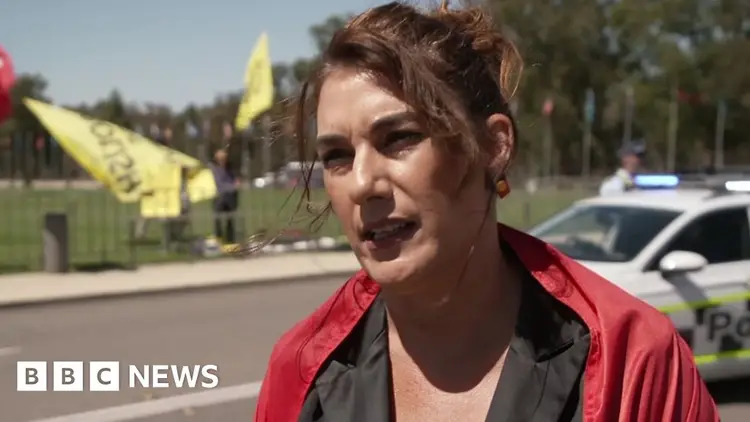Why Australian senator Lidia Thorpe heckled King Charles

Lidia Thorpe is well-known for stirring up debates, and she's spoken out about her opinions on the British monarchy before.
Since 2020, a woman from the Gunnai, Gunditjmara, and Djab Wurrung communities has served as a senator representing Victoria, marking her as the first Aboriginal senator from that state.
Before that, she was involved in Indigenous activism and served as the chairperson for Naidoc (National Aborigines and Islanders Day Observance Committee) in Victoria. This organization focuses on acknowledging and educating Australians about the cultures and histories of First Nations peoples.
In 2022, during her inauguration to parliament following her re-election, she referred to the late Queen as a colonizer.
"I, Lidia Thorpe, make a serious and heartfelt pledge to remain loyal and devoted to Her Majesty Queen Elizabeth II, who represents the colonial authority," she stated during her swearing-in ceremony.
Following feedback from fellow senators, she subsequently reaffirmed the oath as it was written.
The events that took place on Monday likely didn’t catch anyone who keeps up with Australian politics off guard. Lidia Thorpe has been vocal about her beliefs, stating that the arrival of the British led to the mass killing of Indigenous people, and the effects of colonization are still visibly felt by many First Nations communities in Australia today.
Regardless of your opinion on Lidia Thorpe's methods, it's clear that there are significant differences between First Nations people and non-Indigenous Australians in various areas such as education, health, and life expectancy.
In a statement last year, Prime Minister Anthony Albanese pointed out that a young Indigenous man has a higher chance of ending up in prison than attending university. This assertion is supported by statistics highlighted by ABC.
From 2020 to 2022, the life expectancy of Aboriginal and Torres Strait Islander people was estimated to be eight years less than that of non-Indigenous Australians.
"I aimed to communicate a strong message to the King of England that he doesn't hold authority over this country, that he isn’t my king and doesn't have sovereignty," Thorpe stated to the BBC after being escorted out of the Great Hall for heckling. "In order to truly be sovereign, one must belong to this land. He doesn't belong here."
"How can he claim to be the King of our nation while having taken so much wealth from our people and our land? He really needs to return what he's taken. Additionally, he should be open to discussing a peace agreement for our country," she stated.
"We have the ability to take charge and make improvements as a nation, but we must not submit to the colonial powers whose forebears are accountable for widespread killings and genocide."
One of Lidia Thorpe’s main concerns is that Australia is the only Commonwealth country that hasn’t made a treaty with its Indigenous population. She has been advocating for this issue to be addressed as a top priority.
For her, the referendum held last year regarding a Voice to Parliament—a group of Aboriginal and Torres Strait Islander representatives offering guidance to parliament on Indigenous matters—was a diversion from the more crucial issue: establishing a treaty.
Australians overwhelmingly rejected the proposal, and she was among the few Indigenous individuals who also chose to vote no.
She explained to the BBC back then that the Voice aimed to "integrate us into the colonial framework, transforming us into compliant Indigenous Australians who would still face oppression from the colonizers."
However, she was part of a small group among First Nations individuals who took that stance. Areas with a larger Indigenous Australian population mainly supported the yes vote, yet Aboriginal people represent nearly 4% of the total population of Australia. Overall, more than 60% of voters nationwide chose to vote no.
Not every Indigenous leader shows the same concern about royal visits as Lidia Thorpe does.
Allira Davis, who is the co-chair of the Uluru Youth Dialogue, expressed her admiration for the late Queen, calling her "beautiful" and stating that she held great respect for her.
What can we say about King Charles's recent visit?
"I don't believe it's particularly significant. We're an independent nation," Allira Davis stated in an interview with the BBC, just before Lidia Thorpe interrupted him in Canberra.
Grasping the historical context of our nation is crucial. We’re no longer just a predominantly white country; we have become a diverse, multicultural society with significant representation from various backgrounds.
"I'm fully in favor of transitioning to a republic, but we must address the recognition of our First Nations people."
While Lidia Thorpe expresses a perspective that resonates with many regarding the harm caused by colonization—both historically and in the present—her methods are not universally accepted.
According to reports from local news outlets, former colleagues have described her as challenging to collaborate with.
Lidia Thorpe, who has recently become an independent after departing from the Greens due to the party's backing of the Yes vote in the referendum, is not expected to shift her stance. She believes that the King should take on a more significant role in addressing the wrongs of the past.



















































